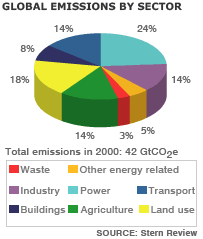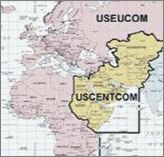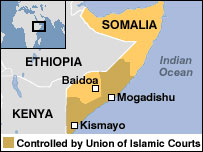Horn of Africa May Be Next Terror Front
By CHRIS TOMLINSON Associated Press Writer
October 21,2006 | NAIROBI, Kenya -- From the Red Sea to Lake Victoria, the Horn of Africa is one of the few places in the world where, if careful, a traveler can move 1,400 miles across four countries without producing a passport or encountering a single government official.
These footpaths, back roads and rivers have been used for centuries by merchants and slave traders, explorers, smugglers and bandits. Rebels easily sneak around the central governments in the big cities.
So could any traveler. Even a terrorist.

Corrupt governments, porous borders, widespread poverty and discontented Muslim populations have created a region ripe for Islamic fundamentalism. The Horn of Africa, home to about 165 million people, is roughly half the area of the United States.
The six countries that make up the Horn -- Somalia, Sudan, Ethiopia, Eritrea, Kenya and Djibouti -- could become the next major front in the war on terrorism. Kenyan police earlier this year caught a smuggler trying to bring in an anti-aircraft missile.
Kenya, and Tanzania just to its south, have already been victims of al-Qaida terrorism, with the bombings at the U.S. Embassies in Nairobi and Dar es Salaam in 1998 and attacks on a hotel and an Israeli airliner in Kenya in 2002. The attacks emanated from neighboring Somalia, which has had no effective central government since 1992 and has a growing Islamic fundamentalist movement.
Western and regional diplomats, speaking on condition of anonymity because of the sensitivity of the topic, said they believe another terrorist attack could be imminent.
Robert Rotberg, director of Harvard University's Program on Intrastate Conflict and Conflict Resolution, said every country in the region is at risk because radicals see an opportunity to take advantage of weak, unpopular governments.
"Governance and the standard of living are so low in that part of Africa," Rotberg said. "There is certainly a possibility of meddling in troubled waters."
Despite a disastrous and short-lived invasion of Ethiopia in 1977 and political anarchy since 1992, Somali nationalists and Islamic fundamentalists still advocate this Greater Somalia. An ethnic-Somali insurgency continues in eastern Ethiopia, led by the Ogaden Liberation Front, a small group that mostly uses pipe bombs or small-scale attacks to advance their cause.
Governments in the Horn of Africa have watched with concern as the Somali Transitional Federal Government they helped create in 2004 after two years of peace talks has been eclipsed by the Islamic Courts Union, led by an elderly cleric, Sheik Hassan Dahir Aweys, who is committed to a nationalist, Islamic regime and allegedly has ties to Ethiopian rebel groups.
"The comfort zone is to look at Somalia as being far away and hope that the problem will resolve itself somehow," Kenya's Minister for Foreign Affairs Raphael Tuju recently told the U.N. General Assembly. But a Somalia with no government in place "is a danger not just to neighboring countries but to the whole world."
Ethiopia, Africa's second most populous country, has sent troops to the Somali town of Baidoa to prop up the official government, which is also backed by the United Nations. Despite the support, though, Baidoa is the only part of the country the government controls.
The African Union, a continentwide diplomatic bloc, has also authorized the deployment of 8,000 Ugandan and Sudanese peacekeepers to protect the government and stabilize Somalia. But with Aweys and other Islamic leaders vehemently opposed, and no rich country ready to pay the bills, the mission has not moved beyond the planning stage.
The Islamic militants' sudden ascendancy and popularity have shaken the region, and the ripples have reached the United States and Europe. The United States urgently formed the International Contact Group for Somalia in July to deal with the sudden rise of Islamic militancy and to politically support the government.
Mario Raffaelli, Italy's special envoy to the former Italian colony, said he believes the struggle between the transitional government and the Islamic Courts Union for control of Somalia could ignite a regional war, drawing in Ethiopia, Eritrea, Kenya and possibly even Sudan.
"The change in Mogadishu has changed the whole regional picture," he said. "And made it much more dangerous."
U.S. Assistant Secretary of State Jendayi Frazer has accused Aweys of sheltering al-Qaida suspects believed to be responsible for the bombings in Kenya and Tanzania. U.S. diplomats also fear al-Qaida operatives will persuade Aweys to turn Somalia into a haven for international terrorists.
"Somalia has been a collapsed state since 1991," said Rotberg, an expert on the Horn. "It obviously opens up some territory for al-Qaida to meddle."
Residents of Mogadishu, though, have felt the Courts Union's hard-line Islamic law which is reminiscent of Afghanistan. It has started public flogging of convicted felons and publicly executed a convicted murderer by firing squad on Sept. 22.
Fatima Mohamud, a 34-year-old housewife, said she welcomed the peace the Islamic militias have brought to the capital, but as a follower of Somalia's moderate Sufi form of Islam, she is not comfortable with the Courts Union's fundamentalist interpretation of Islamic law.
"They closed the video halls where the children would watch soccer matches," she said. "Now three of my boys can hardly go out because they have nowhere to go for entertainment, and they can't dress the way they want; they're told to cut their hair and shorten their trousers."
"I don't know where Islam restricts all these innocent activities," she added.
Leaders of neighboring countries fear that if an Islamic regime is successful in Somalia, fundamentalist clerics in other parts of the Horn will emulate them. The United States has decided to take a soft-sell approach to convincing the millions of Muslims in the region not to join the radicals and instead embrace democracy.
At the strategic point where the Red Sea opens into the Indian Ocean, a territory once known as French Somalia became the independent and stable country of Djibouti in 1977. The nation of 486,000 people has close ties to the West and hosts a brigade from the French Foreign Legion and a U.S. counterterrorism force known as the Combined Joint Task Force Horn of Africa.
The task force, set up in June 2002, is responsible for fighting terrorism in the Horn of Africa as well as Yemen, Tanzania and Uganda. The 1,600 troops assigned to Djibouti use military training, humanitarian aid and intelligence operations to keep nations in the region from becoming terrorist havens.
Officials say they have military liaisons in all the countries except Somalia and Eritrea and carry out humanitarian missions on a regular basis. U.S. troops have also helped train border forces in Djibouti and Ethiopia as well as maritime forces in Kenya to build up those countries' ability to protect their borders with Somalia.
"We feel the best way to counter terrorism is to go after conditions that foster terrorism," U.S. Navy Rear Adm. Richard W. Hunt, the task force commander, said during an operation to refurbish a clinic in Tanzania. "So we focus on medical care, education. We attack these causes right at the very root."
He added that the task force wants to build conditions that never let a terrorist ideology take hold. "The terrorists will go after any area they think they can exploit," Hunt said.
The Horn of Africa needs more than military solutions, agreed Caty Clement, a regional director for the International Crisis Group, a conflict prevention center.
"It does matter to be able to control your borders, to be able to police the population," Clement said. "But it's only one aspect of the problem."
Whether a nation becomes a failed state has a lot to do with poverty, official corruption, international aid and middle-class support for the government, she said. Creating strong legislatures, independent courts and healthy economies goes beyond the capabilities of the military, Clement added.
Those tasks may also be beyond the capabilities of the Islamic fundamentalists. Just three months after taking power, Somalia's Islamic Courts Union has not produced the prosperity and political freedom the people of Mogadishu expected.
"Residents here want to see something different and better than the present stability," said Mohamed Hussein, an economist who has contacts among the Islamic leaders. "People want new political thinking and political pluralism."
The regional leaders, Western diplomats and U.S. troops in the Horn of Africa can only hope that he's right -- and that all of the people of the Horn of Africa also want the same.
--__
Associated Press correspondents Salad Duhul in Mogadishu, Somalia, and Elizabeth Kennedy in Msata, Tanzania, contributed to this report.




